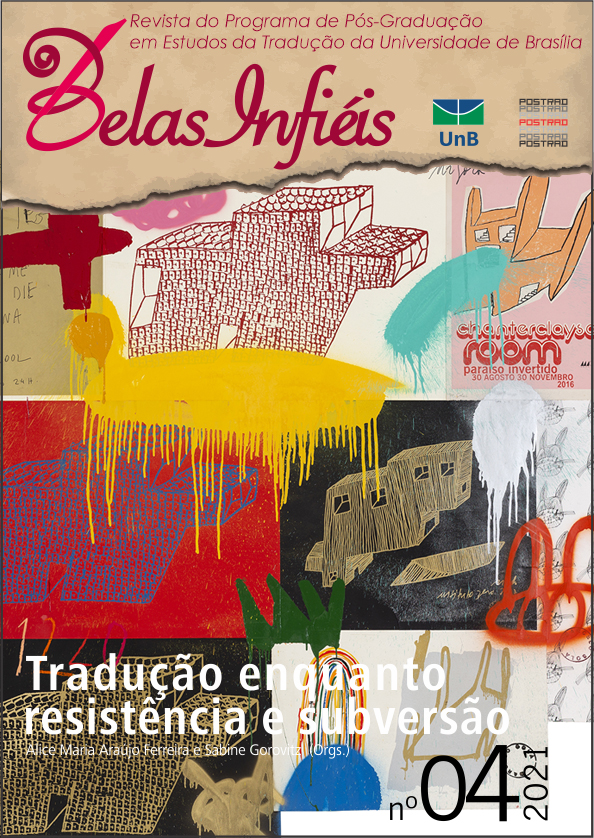Narrativas do Terrorismo e da Segurança: Traduções ‘Exatas’, Enquadres Suspeitos
DOI:
https://doi.org/10.26512/belasinfieis.v10.n4.2021.30322Palavras-chave:
Tradução. Narrativa. Árabe. Muçulmano. MEMRI.Resumo
A construção e disseminação de ‘conhecimento’ sobre comunidades e sobre regiões consideradas uma ameaça à segurança tornou-se uma grande indústria. Grande parte dessa indústria se apoia em várias formas de tradução e, em alguns casos, é gerada por uma equipe de tradutores envolvidos com programas já instituídos e financiados cujo objetivo é selecionar, traduzir e distribuir vários tipos de texto que são provenientes de países árabes e muçulmanos: artigos de jornal, clipes de filmes, transcrições de shows de televisão, excertos selecionados de material educacional, sermões nas mesquitas. Este artigo recorre à teoria narrativa e usa exemplos de instituições que constroem esse tipo de conhecimento no intuito de argumentar que são falhas as tentativas de menosprezar esses esforços pelo questionamento da ‘exatidão’ de traduções. Ao contrário, faz-se necessária uma compreensão mais detalhada dos dispositivos sutis usados para gerar narrativas desumanas dos árabes e dos muçulmanos por meio de programas de tradução com planejamento cuidadoso e com financiamentos robustos.
Downloads
Referências
Baker, M. (2005). Targamat al-sardiyyaat/Sardiyyaat al-targama (Tradução de narrativas e narrativas de tradução) (H. Azmy, Trad.). Fossoul, 66(3), 21–34.
Baker, M. (2006). Translation and conflict: a narrative account. Routledge.
Baker, M. (2007). Reframing conflict in translation. Social Semiotics, 17(2), 151–169.
Baker, M. (2008). Ethics of renarration: Mona Baker is interviewed by Andrew Chesterman. Cultus, 1(1), 10–33.
Baker, M. (2009). Resisting state terror: theorizing communities of activist translators and interpreters. In E. E. Bielsa & C. W. Hughes (Orgs.), Globalization, political violence and translation (pp. 222–242). Palgrave Macmillan.
Bennett, W. L., & Edelman, M. (1985). Toward a new political narrative. Journal of communication, 35(4), 156–171.
Fairclough, N. (2001). Language & power. Pearson Education. (Obra original publicada em 1989)
Fairclough, N. (1995). Critical discourse analysis. Longman.
Friedman, T. (2005, 22 de julho). Giving the hatemongers no place to hide. The New York Times. http://www.nytimes.com/2005/07/22/opinion/22friedman.html
Friedman, T. (2006, 22 de fevereiro). Empty pockets, angry minds. The New York Times. http://select.nytimes.com/2006/02/22/opinion/22friedman.html?_r=1
Gentzler, E. (2002). Translation, poststructuralism and power. In M. Tymoczko & E. Gentzler (Orgs.), Translation and power (pp. 195–218). University of Massachusetts Press.
Harris, L. (2003, 15 de janeiro). A note on MEMRI & translations. Counterpunch. http://www.counterpunch.org/harris01152003.html
Hijazi Al-Sharif, S. (2009). Translation in the service of advocacy: narrating Palestine and Palestinian women in translations by the Middle East Media Research Institute (MEMRI) [Tese de Doutorado, Universidade de Manchester].
Huntington, S. (1996). The clash of civilizations and the remaking of world order. Touchstone.
Livingstone, K. (2005). Why the Mayor of London will maintain dialogues with all of London’s faiths and communities: a reply to the dossier against the Mayor’s meeting with Dr. Yusuf al-Qaradawi. Greater London Authority.
Moore, K., Mason, P., & Lewis, J. (2008). Images of Islam in the UK: the representation of British Muslims in the national print news media 2000–2008. http://www.cardiff.ac.uk/jomec/resources/08channel4-dispatches.pdf
Norouzi, A. (2007). ‘Wiped off the map’ – the rumor of the century. http://www.antiwar.com/orig/norouzi.php?articleid=11025
Packer, G. (2007, 26 de março). Betrayed: the Iraqis who trusted America the most. The New Yorker. http://www.newyorker.com/reporring/2007/03/26/070326fa_fact_packer
Pappe, I. (2009). De-terrorising the Palestinian national struggle: the roadmap to peace. Critical Studies on Terrorism, 2(2), 127–146.
Philo, G., & Berry, M. (2004). Bad news from Israel. Pluto Press.
Shamma, T. (2005). The exotic dimension of foreignizing strategies: Burton’s translation of the Arabian Nights. The Translator, 11(1), 51–67.
Shamma, T. (2009). Translation and the manipulation of difference: Arabic literature in nineteenth century England. St. Jerome Publishing.
Steele, J. (2006, 14 de junho). Lost in translation. The Guardian. http://www.guardian.co.uk/commentisfree/2006/jun/14/post155
Toury, G. (1995). Descriptive translation studies and beyond. John Benjamins.
Tymoczko, M. (2000). Translation and political engagement: activism, social change and the role of translation in geopolitical shifts. The Translator, 6(1), 23–47.
Venuti, L. (1993). Translation as cultural politics: regimes of domestication in English. In M. Baker (Org.), Critical readings in translation studies (pp. 65–79). Routledge.
Venuti, L. (1995). The translator’s invisibility. Routledge.
Whitaker, B. (2002, 12 de agosto). Selective MEMRI. The Guardian. http://www.guardian.co.uk/elsewhere/journalist/story/0,7792,773258,00.html
Whitaker, B. (2007, 15 de maio). Arabic under fire. A child on Hamas TV talked of annihilating the Jews… or did she? The Guardian. http://www.guardian.co.uk/commentisfree/2007/may/15/arabicunderfire
Downloads
Publicado
Como Citar
Edição
Seção
Licença
Copyright (c) 2021 CC BY

Este trabalho está licenciado sob uma licença Creative Commons Attribution 4.0 International License.
Dado ao acesso público desta revista, os textos são de uso gratuito, com obrigatoriedade de reconhecimento da autoria original e da publicação inicial nesta revista
A revista permitirá o uso dos trabalhos publicados para fins não comerciais, incluindo direito de enviar o trabalho para bases de dados de acesso público. As contribuições publicadas são de total e exclusiva responsabilidade dos autores.
Os autores, ao submeterem trabalhos para serem avaliados pela revista Belas Infiéis, mantêm os direitos autorais e concedem à revista o direito de primeira publicação, sendo o trabalho licenciado sob a Creative Commons Attribution License Atribuição 4.0 Internacional (CC BY 4.0).



















